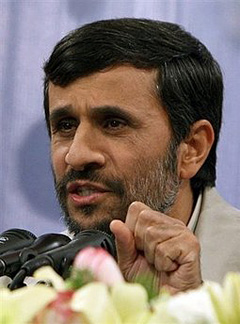
|  |  |  Editorials | Issues | January 2009 Editorials | Issues | January 2009  
Barack Obama's Public Diplomacy
 Martin Schram - Capitol Hill Blue Martin Schram - Capitol Hill Blue
go to original


| | Iranian President Mahmoud Ahmadinejad, seen here on January 15, 2009, demanded on Wednesday that President Barack Obama apologise for past US "crimes" against the Islamic republic, after the new US leader extended a hand of diplomacy to Tehran. (AFP/Atta Kenare) |  |
Faster than a command to "lock-and-load," President Obama this week swiftly deployed and targeted a powerful but little-used weapon that could be crucial to winning what America once called its war on terror.

It is a weapon long championed by Obama's two famous holdovers, Defense Secretary Robert Gates and Gen. David Petraeus. And it was targeted this week at the Arab world.

It is public diplomacy.

The decision to deploy the weapon of public diplomacy came when Obama decided to grant the first television network interview of his new presidency. He bypassed the usual alphabet soup of suspects (ABC, CBS, CNN, FNC, NBC, MSNBC) and selected al-Arabiya. On Monday, he used that large satellite network based in Dubai to put America's best face before the Muslim world.

Obama's message was a blend of uplift and down-to-earth truth.

"Now, my job is to communicate...to the American people that the Muslim world is filled with extraordinary people who simply want to live their lives and see their children live better lives.

"My job to the Muslim world is to communicate that the Americans are not your enemy. We sometimes make mistakes. We have not been perfect. But if you look at the track record, as you say, America was not born as a colonial power, and that the same respect and partnership that America had with the Muslim world as recently as 20 or 30 years ago, there's no reason why we can't restore that."

The Obama vision looms as a sort of 21st Century remaking of Back to the Future.

That also proved to be his approach for getting past the decades of hatreds that underlie the Israeli-Palestinian crisis. He said peace efforts must focus on the future: "...is a child in the Palestinian Territories going to be better off? ...And is the child in Israel going to feel confident about his or her safety and security? And if we can keep our focus on making their lives better and look forward, and not simply think about all the conflicts and tragedies of the past, then I think that we have an opportunity to make real progress."

Obama said his first-round of instructions to his new Middle East peace envoy, former Sen. George Mitchell, was just to listen. "Because all too often the United States starts by dictating - in the past on some of these issues - and we don't always know all the factors that are involved. So let's listen. ... From there we will formulate a specific response."

Interviewer Hisham Melhem noted that while President Bush's "war on terror" broadly included all Islamic fascism, Obama focuses more narrowly on al Qaeda and its collaborators. The Arab world, he added, has seen "a demonization of America.... It's become like a new religion, and like a new religion it has new converts (and)... its own high priests."

He mentioned al Qaeda's Osama bin Laden and Ayman al-Zawahiri. "They seem nervous," Obama interjected, noting their attacks on him even before he took office. "What that tells me is that their ideas are bankrupt. There's no actions that they've taken that say a child in the Muslim world is getting a better education because of them, or has better health care because of them. In my inauguration speech, I spoke about: 'You will be judged on what you've built, not what you've destroyed.' And what they've been doing is destroying things. And over time, I think the Muslim world has recognized that that path is leading no place, except more death and destruction."

The power of public diplomacy - communication, advocacy, development, and outreach - has been famously extolled yet infamously executed. Under Bush it floundered - dreary dogma chasing its own frayed tale. But now we have a Decider who is also a Conceptualizer. A 21st Century Great Communicator who is a Global Ambassador.

Hopefully we can use this weapon to its fullest uplifting potential.

(Martin Schram writes political analysis for Scripps Howard News Service. Email him at martin.schram(at)gmail.com.) |

 |
|  |



